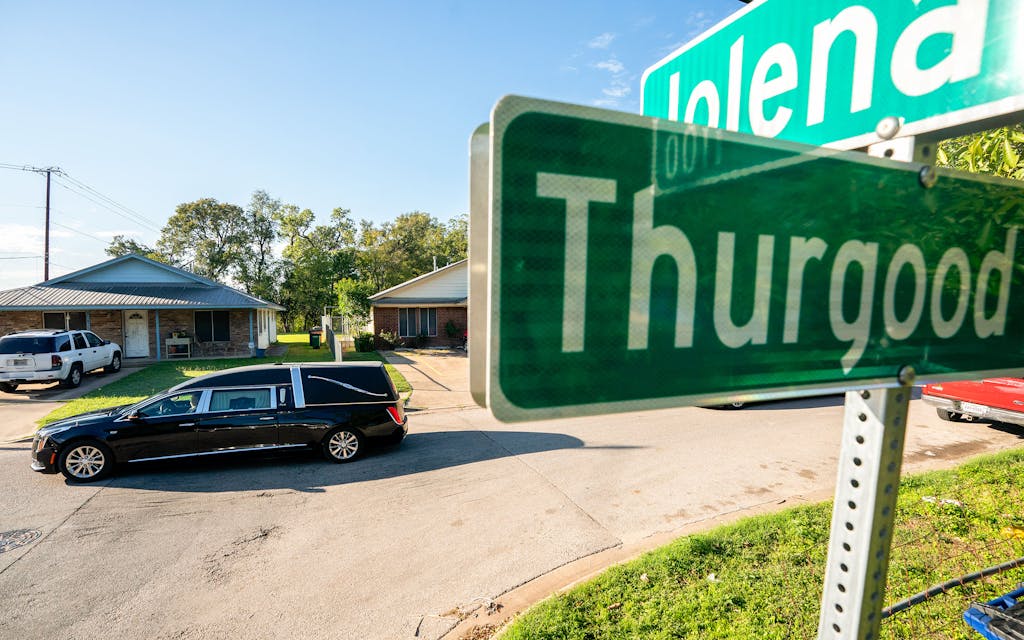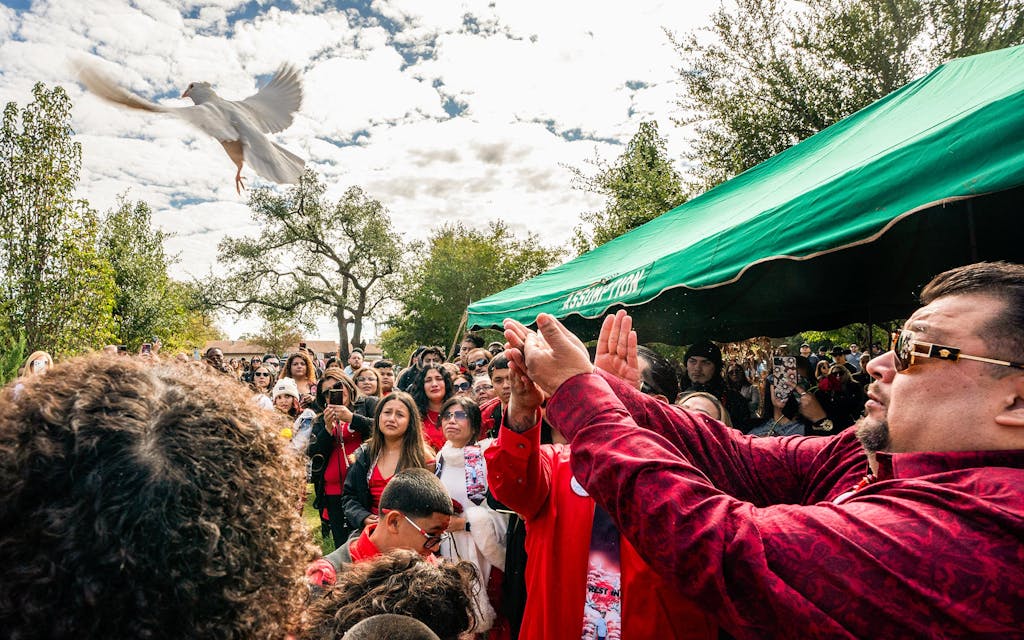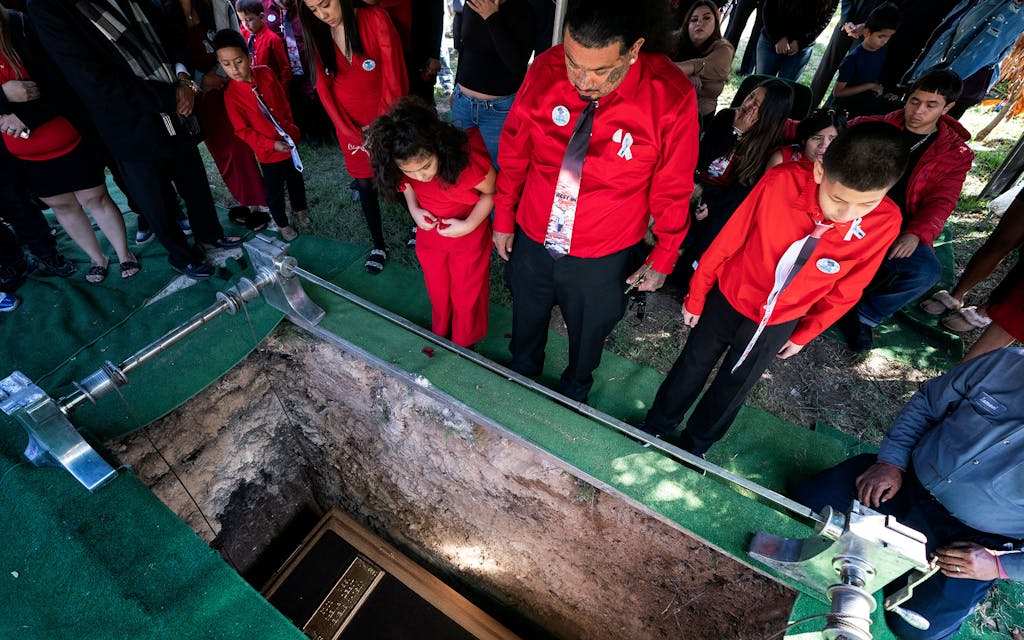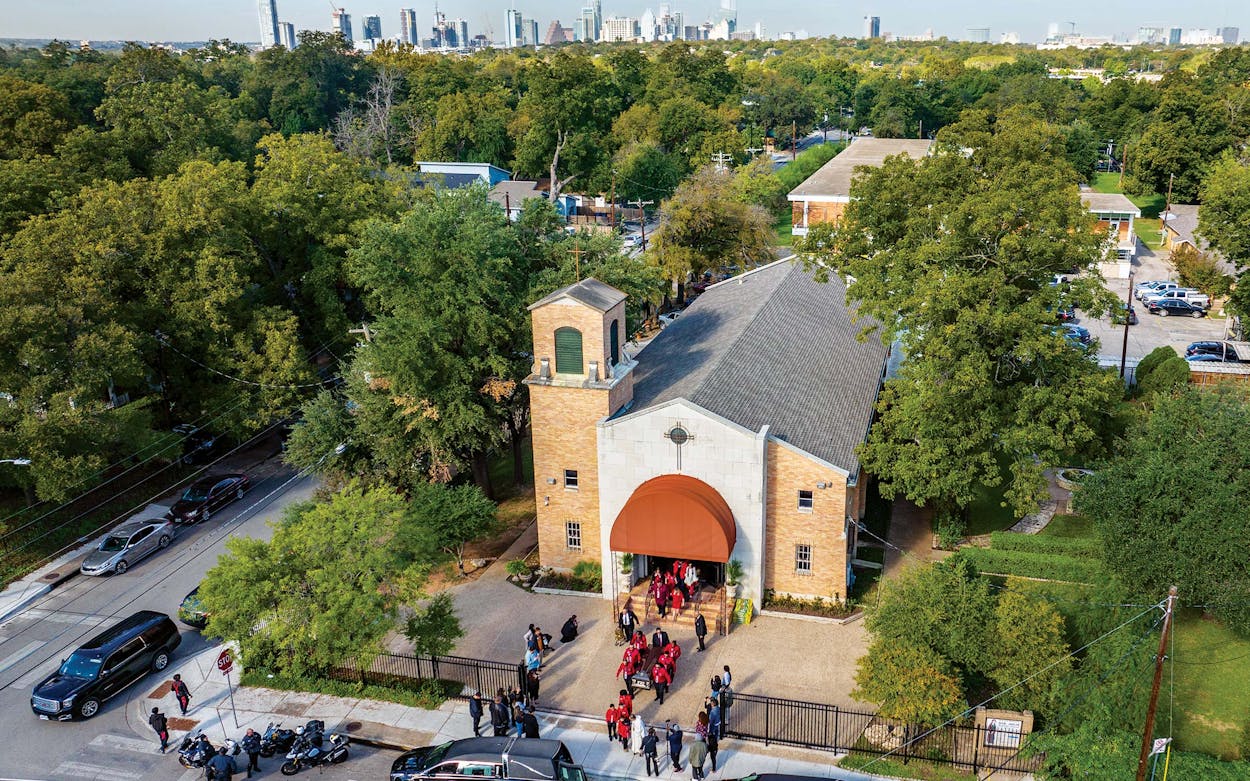When Arleen Juarez was designing a memorial T-shirt for her son, Diomani, to wear to his father’s funeral, she decided quickly on the image that would go on the front: a photo of father and son, taken from behind as they squatted together on an empty baseball diamond. For the back of the shirt, though, she struggled to find a quote that felt right. Searching the internet, she came across a line from a journal entry by the American poet Anne Sexton: “It doesn’t matter who my father was; it matters who I remember he was.”
Who Josh Rivera was is complicated, but it could probably best be summed up by what his cousin Alexia Aleman told me at the wake: “Josh loved feeling loved.” It was a need he carried with him right up until he was shot to death in a southeast Austin house in October.
Josh hailed from a part of the city far removed from the high-tech, high-rent metropolis that much of Austin has become. He and his friends were among perhaps the last generation to know the city’s East Side as it once was—a primarily Black and Hispanic neighborhood lined with clapboard shotgun houses, where lowriders cruised on Sunday afternoons without prompting noise complaints and cheap tacos and tortas could be found on East Cesar Chavez Street.

Joshua Steven Lopez Rivera was born on November 22, 1994, to eighteen-year-old Henry Rivera Jr. (a.k.a. Little Henry) and twenty-year-old Barbara Ann Lopez into what Josh’s older brother, Henry III (a.k.a. Baby Henry), called “the agony life.” Little Henry, by his own admission, was more focused on “illegal business” than on his sons’ upbringing, and after splitting up with Barbara, he was incarcerated in federal prison on a ten-year sentence for drug trafficking when Josh was five.
Josh and Baby Henry bounced back and forth between their paternal grandmother and their mother, enduring a string of stepfathers who, according to Baby Henry, ranged from tolerable to violently abusive. Baby Henry, two years Josh’s senior, assumed the role of protector, literally shielding his little brother’s body from beer bottles and belt buckles. Ten-year-old Baby Henry would regularly threaten to kill one of his mother’s abusive husbands, and when he grabbed a pocketknife one cold night to make good on his promise, he was shipped off to a camp for troubled boys, where he’d stay for the next three years. That first Christmas without Henry, Josh told his mom he didn’t want to open his presents until his big brother came home. At the end of one off-site visit, during which things briefly felt almost normal, Josh clutched his older brother in a hug and cried, not wanting him to leave again.
With both of his male protectors gone, Josh drew all the more tightly to his mother, even as she dealt with her own instability. “[He was] a true momma’s boy,” Alexia said—so much so that Josh would later have those two words tattooed in inch-high scripted letters along his right jawline.
Baby Henry eventually returned from camp, and the two adolescents, still without a father in their day-to-day lives, found a home in the open arms of Thurgood Avenue, a tight-knit, two-block street in East Austin where Josh and Henry’s paternal grandmother lived in a three-bedroom house and where Baby Henry estimates that 90 percent of the boys “were raised by our grandmothers.” Like so many sons of incarcerated fathers, Josh and Baby Henry found on Thurgood a sense of belonging and protection but also trouble. It wasn’t long before Josh began smoking weed, carrying a gun, and wearing red, associating himself with the Thurgood Bloods, the dominant gang in the area.
When Little Henry got out of prison, in 2008, he tried to connect with thirteen-year-old Josh but found it difficult. “I remember having so much trouble with him,” Henry told me. “He was just so rebellious. He had a lot of anger, like anger towards me.”
One day, suspicious that his sons were involved in the same sorts of illegal activities he had engaged in, Little Henry yelled that the cops were coming. “All kinds of guns came out, drugs came out. And I remember him taking off, and me thinking, ‘Oh my god, what is my boy doing with this?’ ”
It was around this time, in 2009, that I first met Josh, while working on the project that would become a story, “The Boy From Booker T,” that was published in this magazine two years ago. He was a quick-witted fourteen-year-old with a thousand-watt smile, a head bursting with soft black curls, and an unmistakable staccato laugh. He was falling quickly for an older girl, eighteen-year-old Arleen Juarez, who remembers being smitten with his luscious locks and asking during their first conversation if she might run her fingers through them.
The bliss of their teenage romance was soon shattered by the 2010 death of Arleen’s brother Christian in a car accident. Two months later Josh’s mom was killed in a motorcycle crash. That loss sent him into a tailspin of grief from which he would never recover. “She died, and then all hell broke loose,” Josh would later say.
“He wanted true love. Like, he was really that obsessed with what everybody wants—to be loved,” his tía Yvette Rivera told me. “And he didn’t have that. The person that loved him the most was no longer here.”
Turning to harder drugs to cope, Josh was arrested twice for assaulting Arleen. Amid their struggles they welcomed Diomani in 2012 and a daughter, Hailee, two years later, but they split up for good in 2016. After assaulting another woman in 2018, he was incarcerated in Pam Lychner State Jail, in Humble, just outside Houston, where I visited him in 2020.
Sitting in a plastic chair by a window, Josh spent a half hour with me, discussing his regrets but also his hopes for the future. “I hope for a lot, a lot of difference,” he told me of his eventual release. “I hope to one day be again with their mom, so we can be a family, and I can be there with my kids every day; you know, same mom, same dad, same household, same family; you know, tuck my kids in, wake ’em up, brush their teeth, take ’em to school. I hope to have that again one day.” It was a sentiment I heard frequently from the young men I interviewed for “The Boy From Booker T”—the desire to be the kind of present, involved fathers they had lacked.

When Josh was released, in October 2022, he and Baby Henry once again shared a tearful embrace. “It was the best version of him that I’ve ever seen,” his big brother recalled. He was eating healthily, Henry says, strictly avoiding pork and sodas, and “just had this glow.” He got a job as a trash collector for the City of Austin, waking up before 5 a.m. each day to stop by his cousin Alexia’s to grab the chicken, veggies, and black coffee she’d prepare for him. He’d shout “I love you, Lex!” on the way out the door, and later he would send her a few bucks to cover the coffee.
He also tried to make up for lost time with Diomani and Hailee, now ten and eight, taking them for staycations at local hotels and for daylong movie marathons. Proud to finally be earning his own money legally, he’d splurge on the kids, once spending $80 on snacks at the movie theater.
Even Arleen, though resolved to never get back together with him, felt optimistic about the changes she saw in her children’s father. “He put structure into their lives,” calling every night at 7:45 to remind them to brush their teeth. “He knew the kind of father he wanted to be,” she said. “It hurts to know Dio and Hailee will never have Josh to call on as adults.”

The rain was running heavily down Baby Henry’s windshield on October 24, 2023, when he began to worry. Josh always answered his phone or at least called right back. On that Tuesday afternoon, four hours had passed without any response. The next morning, after several more unanswered calls and texts, Josh’s phone went straight to voicemail. “He gotta be in jail,” Baby Henry figured, as he checked in with his dad, or perhaps Josh had been in a car accident.
As the family made frantic calls to area jails and hospitals, someone hesitantly suggested the morgue. An employee there directed Josh’s dad to an Austin Police Department homicide detective. “I was by myself at the house,” Baby Henry said, when he got the call from his dad, “and I just screamed so loud. I just couldn’t believe it. I just started yelling. I was like, ‘No! Not my little brother, man! No, not my brother!’ ”
The exact truth of what happened in the southeast Austin house where Josh was allegedly murdered by his new girlfriend’s stepfather may never be known. The lurid stories reported in the local news draw only from the alleged shooter’s testimony given to police after his arrest. In his affidavit, 46-year-old Joshua Trezaratti states that, angered by unwanted sexual advances he claimed Josh made toward his wife, he shot Josh at least five times—once or twice after Josh was already lying on the ground, because Trezaratti “wanted to make sure he was —- dead.” Trezaratti also said that Josh had physically abused his stepdaughter and threatened the family previously. Josh’s family believes he was lured to the home and ambushed.
Coming from Thurgood, where the police are generally viewed with suspicion, and with three felonies of his own, Baby Henry is not accustomed to looking to the legal system for help. “I ain’t never liked the police,” he said. “And for me to be like, ‘I want justice for my brother,’ is even crazy for me to say.” But he’s determined to not “do something stupid” that would cause his father more heartache. As Baby Henry yearned for revenge, his dad reminded him, “We’re gonna leave it in God’s hands. We’re gonna let justice take care of it.”


At the visitation, held on November 1, el Día de los Muertos, “Mexican Heaven” by SPM, Josh’s favorite rapper, and Eric Clapton’s “Tears in Heaven” played on repeat as more than one hundred people, many of them dressed in Josh’s favorite color, red, filed into Mission Funeral Home on East Cesar Chavez to pay their respects. Nine-year-old Hailee hung close to Arleen while her brother, Diomani, wearing his custom T-shirt and red Converse All Stars (his father’s favorite shoe), leaned against the wall next to an old grandfather clock, watching videos on his phone and pausing just long enough to receive sympathetic hugs from teary-eyed aunts and grandmothers. Josh’s friends from Thurgood stepped in and out of the cool night air, sharing memories and cigarettes.

After the mourners murmured through a litany of Hail Marys and Our Fathers, Josh’s father moved to the front. He leaned his hulking frame on the lectern, his bright red button-up shirt matching the carpet and the lavish array of flowers surrounding his son’s casket. Breathing heavily, with eyes hidden behind dark sunglasses, he spoke slowly. “I was proud of him, and I shoulda told him, but I didn’t,” he admitted. “I wanna break down. I wanna cry. Tell my boy I’m so sorry. I’m so sorry, mijo. I know I didn’t show you love. Sometimes I treated you more like a friend. It was just so hard to get through to you.”
When Little Henry met with the APD investigators for the first time, he brought his son’s baby picture. “I know my son, you look at him as a little gangbanger, tattoos everywhere; to you it’s another hoodlum off the street, another less worry for society,” he told them. “But that’s not the case. That’s my little boy. . . . He was somebody. He was loved. A lot of people see someone like him, and they don’t think of him as a person. They think of him as trash. But they’re wrong. My boy ain’t trash.”
Jeffrey McWhorter is a photojournalist who lives in Dallas.
This article originally appeared in the February 2024 issue of Texas Monthly with the headline “ ‘My Boy Ain’t Trash.’ ” Subscribe today.
- More About:
- Austin







